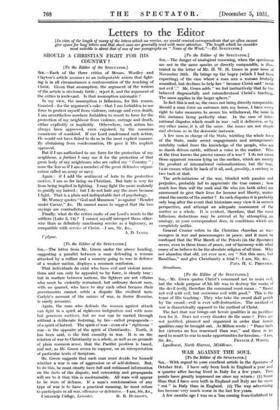Letters to the Editor
[In view of the length of many of the letters which we .receive, we would remind correspondents that we often cannot gire space for long letters and that short ones are generally read with more attention. The length which we consider most suitable is about that of one of our paragraphs on " News of the Week."Ed. SPECTATOR.]
SHOULD A CHRISTIAN FIGHT FOR HIS COUNTRY?
[To the Editor of the SPECTATOR.] Sin,—Each of the three critics of Messrs. Woolley and Clayton's article assumes as an indisputable axiom that fight- ing is in all circumstances a contravention of the teaching of Christ. Given that assumption, the argument of the writers of the article is obviously futile ; reject it, and the argument of the critics is irrelevant. Is that assumption axiomatic ?
In my view, the assumption is fallacious, for this reason. Granted—for the argument's sake—that I am forbidden to use force to protect myself from violence, outrage and even death, I am nevertheless nowhere forbidden to resort to force for the protection of my neighbour from violence, outrage and death, either explicitly or implicitly. Othenvhere, such action has always been approved, even enjoined, by • the common conscience of mankind. If our Lord condemned such actiOn, He would not have failed to do so in the most explicit manner. By abstaining from condemnation, He gave it His implicit approval.
But if I am authorized to use force for the protection of my neighbour, a fortiori I may use it for the protection of that great body of my neighbours who are called my " Country " ; none the less so if I am a member of the great defensive organi- zation called an army or navy.
Again : if I add the sentiment of hate to the protective motive, I am so far being un-Christian. But hate is very far from being implied in fighting. I may fight the More zealously to gratify my hatred ; but I do not hate any the more because I fight. That is a plain and indisputable fact of psychology.
Mr. Wansey quotes " God and Mammon" as against " Render under Caesar," &c. He cannot meant() suggest that the two sayings are contradictory.
Finally, what do the critics make of our Lord's words to the soldiers (Luke 3, 14) ? I cannot myself interpret them other- wise than as definitely sanctioning service as a legionary, as compatible with service of Christ.—I am, Sir, &c.,










































 Previous page
Previous page